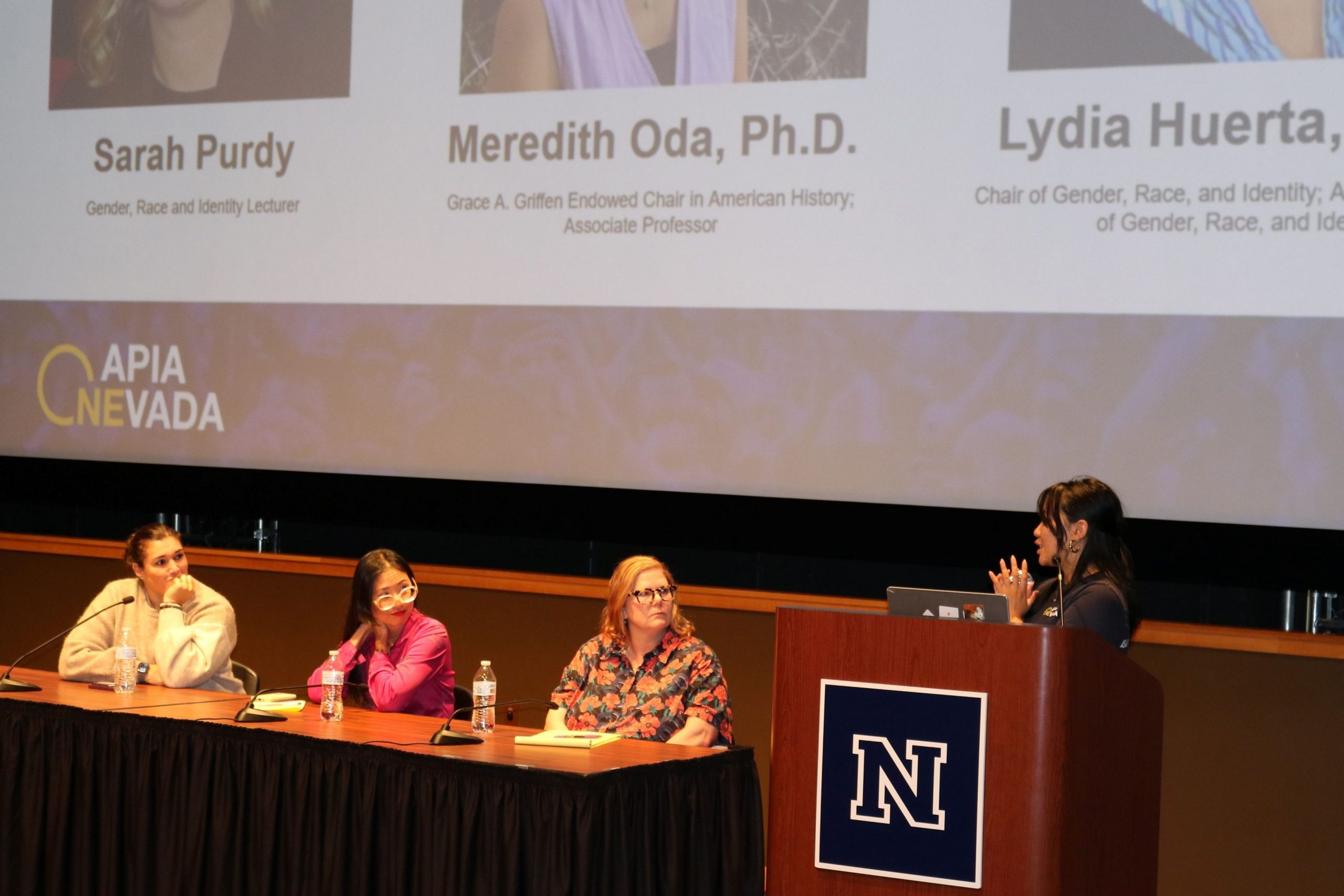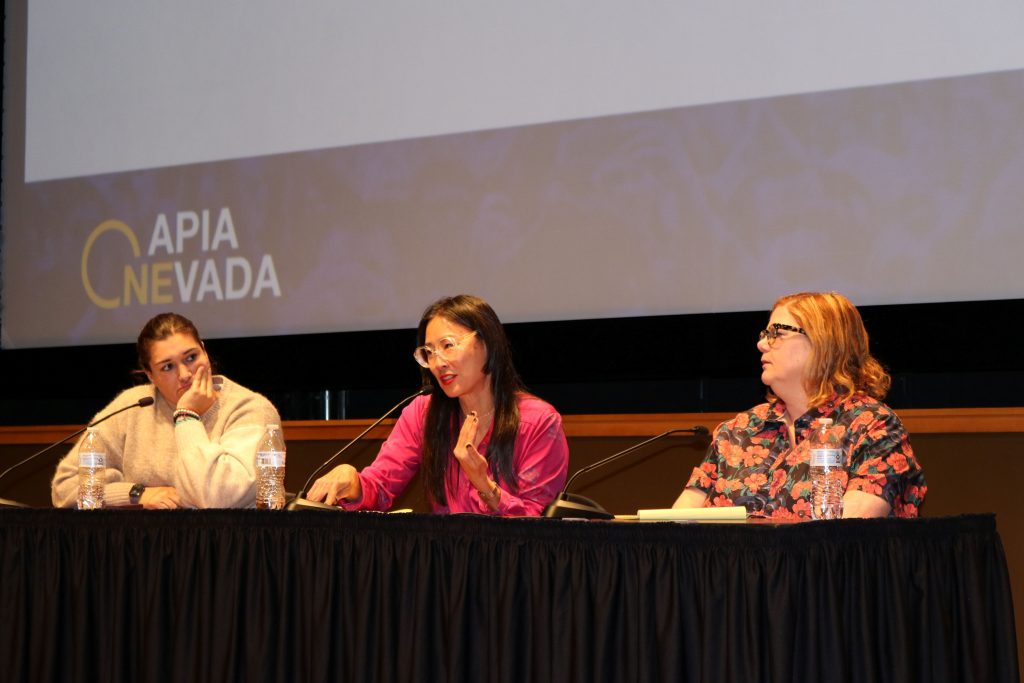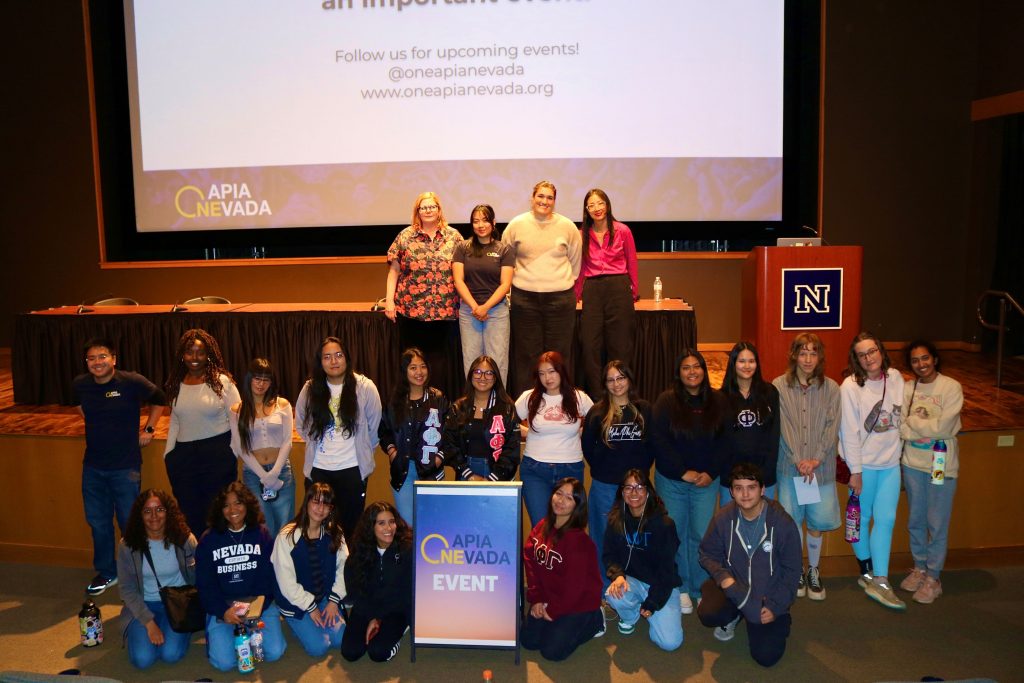Content warnings: Domestic violence, generational trauma, abuse
Nonprofit grassroots organization One APIA Nevada invited University of Nevada, Reno students for a screening of “Everything Everywhere All At Once” and a discussion panel of UNR professors to examine themes of generational trauma and domestic violence in Asian American Native Hawaiian and Pacific Islander (AANHPI) households, in light of Domestic Violence Awareness month.
UNR junior Abby Herrera organized the event. She is a member of Alpha Phi Gamma, a multicultural sorority that advocates against domestic violence toward women. Being an Asian woman herself, she said she carries her own thoughts and curiosities surrounding the idea of generational trauma and domestic violence. The film “Everything Everywhere All At Once” served as a perfect depiction to relate these topics.
“As an Asian American, specifically a Filipino American, I related so much to a lot of the scenes,” Herrera expressed, “especially when it comes to scenes related to the relationship between Evelyn and Joy.”
The 2022 sci-fi action film starring Michelle Yeoh, Stephanie Hsu and Ke Huy Quan showcases turbulent familial relationships and making amends with loved ones. A Chinese immigrant mother transcends the multiverse, obtaining extraordinary abilities and the ability to find understanding, empathy and acceptance.

Many Asian American women, including Herrera, see themselves in this film as a reflection of the protagonist’s daughter, who endures disapproval from a criticising mother who struggles to display emotion and affection. Herrera views the film and discussion panel as impactful in opening the eyes of conflicted attendees who would like to break their own cycles of generational trauma.
In AANHPI households, problematic cultures exist, including LGBTQ+ discrimination and insecure body image stemming from parental abuse. The adoption of these unhealthy mindsets creates a never-ending cycle from parent to child; This is the start of generational trauma.
Professor Sarah Purdy is a gender, race and identity lecturer. She highlighted how the protagonist, Evelyn, repressed her trauma. She experienced emotional abuse as a Chinese immigrant and from her father who had once disowned her. As a result, she has unintentionally put a strain on her relationship with her husband and daughter.
Associate professor Meredith Oda called attention to the high stakes that immigrants and people of color face with domestic violence, saying there is a certain stigma and fear of speaking up against domestic abuse, particularly for minorities.
“Not only are you dealing with abuse at home or have dealt with abuse as a child, as a partner, as an elder, but you’re also dealing with the pressures of being a radicalized, minoritized person in the United States,” she said.
Oda used the character Joy as an example, mentioning her attempts to communicate with her mother in hopes of recognition of her sapphic relationship, but being inevitably ignored. This exhibits the seemingly impossible difficulty in ending the cycle of abuse and mending familial relationships.
A desire to keep a relationship with a parent or partner, even if it brings pain, keeps one in a cycle of domestic abuse. This poses a challenge in people seeking help as they are fearful of “the idea of leaving what seems familiar for something that is completely unfamiliar,” even if it comes at the cost of abuse, as Oda put it.
Assistant professor and Chair of gender, race and identity, Lydia Huerta, shared that status is another factor that pulls people towards relationships with domestic abusers. People often stay in abusive relationships due to legal implications and economic dependency. As such, the person with status manipulates their partner to stay in the relationship, especially when they are young or have the commitment of children. These victims of domestic violence believe that there is no one else to turn to except their abuser.

In “Everything Everywhere All At Once,” Evelyn tolerates constant verbal abuse and belittlement from her father who had once disowned her for marrying Waymond. Still, she wants to please her father and gain approval, even if it costs her the relationship she has with her daughter.
“There’s a comfort there,” Huerta said, “that’s our support system at some level even though there is abuse happening there.”
Oda shared how unsolicited comments from family can take a lifelasting toll on self image. She has experienced this and intends to prevent it with her daughter, whether it be from herself or her parents. There are often times where people don’t receive affection or security from inexpressive, unaccepting parents or partners. In the film, Evelyn is too preoccupied by her father and business to build a connection with her husband and daughter, who she routinely overlooks and ignores. In contrast to what she has experienced in the past, Oda expresses her full unconditional love and acceptance of her daughter to end the chain of generational trauma.
“I feel like it’s less about my relationship with my parents and sort of my relationship with my daughter that I’m trying to focus on,” she said.
To heal from generational trauma and domestic abuse, Purdy stated that only through vulnerability can you begin to mend your relationships and yourself – to share that you want to fix it and share the pain that you have carried within.

“We can’t really make change unless you’re willing to address the things that have harmed you,” she said.
It isn’t until the end of the film that Evelyn doesn’t feel the need to appeal to her father and comes to an understanding with her husband and daughter. Through reaching acceptance of herself and her family, she starts anew and heals alongside her daughter.
When interacting with someone who has inflicted trauma upon you, their actions can be due to their own past trauma and not knowing how to express the love they have never been shown. This serves as a reason, but not a justification. By identifying the cycle of trauma, you can begin to end it. For some, the best way to break free from the chain is to take a step back and put some distance between them and their abuser.
Those who have found themselves in abusive environments have the opportunity to recognize their situation and lift themselves out of it through introspection and therapy. Exploring one’s feelings and speaking up about one’s pain is the first step of healing from generational trauma and domestic violence.
Resources:
- Domestic Violence Resource Center: (775) 329-4150
- Sexual Assault Support Services Hotline: Text or call 988
- National Suicide Prevention Lifeline: 1-800-273-8255
- NevadaCARES: (775) 682-8006
- Title IX Office: (775) 784-1547
- Counseling Services: (775) 784-4648
